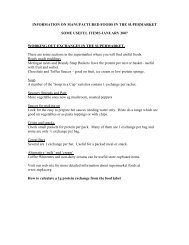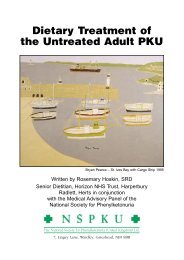You also want an ePaper? Increase the reach of your titles
YUMPU automatically turns print PDFs into web optimized ePapers that Google loves.
and Me<br />
tends to drink more quickly too. A couple of weeks<br />
ago she surprised us all by suggesting that Daddy<br />
should give her her milk, so progress is being made<br />
there too. The next thing is to wean her off the<br />
bottle and to persuade her to drink independently.<br />
These are proving more difficult, but we are making<br />
slow progress (using positive consequences again!)<br />
and, of course, the important thing is that she is<br />
taking her Maxamaid and in doing so is not ruining<br />
family life anymore!<br />
This is what happened in our family. Every child<br />
and every family is different so what worked for us<br />
might not work for everyone, but the most valuable<br />
things that I found were these:<br />
Keep a chart over a few days of who does what<br />
and when and the consequences. You might see<br />
a pattern or be able to identify behaviour that<br />
could be turned around. Make sure you record<br />
when things go well as this may give you clues for<br />
which steps to take next. Remember to take into<br />
account your child’s age and developmental stage<br />
when looking at making changes.<br />
The child should know that positive<br />
consequences will follow when the supplement<br />
has been taken – even if this is just praise.<br />
Make a point of working out what your child<br />
really likes, look at consequences that fit with your<br />
child and your family and are simple to put into<br />
place. Tesni’s stripy tights are a good example –<br />
when she takes her milk she gets to wear her<br />
favourite tights.<br />
The child should be given attention for “good<br />
behaviour” (i.e. complying!) and not for refusing<br />
to comply. Remember attention includes lots of<br />
persuasion and even shouting! Make sure you are<br />
not “rewarding” the behaviour you don’t want by<br />
mistake.<br />
Establish some simple ground rules that are<br />
non-negotiable, and stick to them! Choose<br />
something realistic and if there are other adults<br />
around, choose something you can all agree about<br />
I hope this is useful. To quote that great<br />
philosopher Pete Bramley: “The diet takes some<br />
doing, the administering of the diet is even harder<br />
for the younger ones and even harder for the older<br />
ones and even harder on us all. If we don’t help<br />
each other, it gets even harder. Just one bit of help<br />
can make it much easier.” Yeah.<br />
Comment from Anna Brazier: Although I have<br />
worked with children and families who are facing all<br />
kinds of medical conditions, I had not previously<br />
worked with a family where a child had PKU. When I<br />
had done some homework about PKU prior to meeting<br />
Tesni and her family, I was thinking about how difficult<br />
it must be to try to keep calm about something as<br />
important as Maxamaid. It struck me how quickly<br />
children must learn that parents would probably do<br />
anything to make sure that they have their special milk.<br />
As it turned out, Tesni had learned that lesson very<br />
well. I wonder if that rings bells for other parents?<br />
Claire’s initial reaction to the referral was one which<br />
many parents describe to me once they know me better.<br />
No one wants to feel that they might be criticised as a<br />
parent and I think these feelings run particularly high<br />
when a child has a medical condition. Her second<br />
comment “what is a clinical psychologist anyway?”<br />
reflects the fact that there are not many of us about.<br />
Clinical Child Psychologists have a psychology degree<br />
and a postgraduate degree in Clinical Psychology. This<br />
means that they take a psychological approach to<br />
whatever difficulties are brought to them. In practice<br />
that means talking about behaviour (who does what<br />
when), talking about a child’s development,<br />
temperament and relationships, and about the<br />
particular challenges of the child’s medical condition.<br />
Naturally, the talking will focus on different aspects of<br />
family life depending on the difficulties encountered.<br />
Usually some time is spent trying to understand the<br />
difficulty and the context in which it happens (and<br />
doesn’t happen). Very often a discussion together with<br />
taking time to think, allows parents to come up with<br />
ideas, after all, it is they that know the child best. Our<br />
training helps us to ask the right questions to get the<br />
discussion going in a problem solving way. We also<br />
have time to consider the emotional impact of having a<br />
child with a medical condition. Sometimes in busy<br />
outpatients clinics it can seem as if everyone is just<br />
getting on with it without a problem and parents can<br />
feel quite isolated.<br />
Even if there are no clinical psychologists attached to<br />
your unit, many dietitians have access to one.<br />
Sometimes someone might be available to run a one off<br />
discussion group, or to problem solve with the dietitian<br />
if you’ve got a bit stuck about what to try next. The<br />
important thing to remember is that most parents<br />
encounter this kind of difficulty at some point and that<br />
there is usually someone in the team who can help if<br />
you take the initially difficult step of asking.<br />
Claire Rowlands<br />
News & Views Issue 107 11

















